- Article
- Read in 9 minutes
Genesis – We Cant Dance – CD review
In the early 90s Genesis reached the commercial peak of their career. We Can’t Dance produced no less than six singles. It also turned out to be the last one with Phil Collins.
Another Chance Hello …
11th November 2021: While Genesis are in between the UK and North American leg of their The Last Domino? Tour, fans celebrate the 30th release anniversary of their last studio album with Phil Collins, We Can’t Dance. For most of us, it’s unbelievable this release happened 30 years ago already. Some of us became fans at the time, others were more or less frustrated as they loved the prog era in the 70ies.
Some facts about the album:
We Can’t Dancewas released on 11th November 1991 in the Europe and a day later in North America. Some websites (and even the official merch store) claim it was released earlier in the US, but this is NOT true. Several facts prove that it was released the same week as in Europe (pomotional copies indicating a world wide start of the radio promo on 7th Nov, charts entry in the US and articles in newspapers).
The album was hugely successful. Whether or not it was more successful than Invisible Touch – who knows? But it was yet another million seller on both sides of the Atlantic, this time breaking records in Germany with 24 weeks at number one and 6 single releases.
It was produced by Nick Davis and had a slightly warmer sound than Invisible Touch.
Mike Rutherford used a Rickenbacker guitar on Tell Me Why.
Phil is the only one (again) on vocal duties.
A documentary about the making of the album, No Admittance, was aired in the very early 90ies and eventually found its way onto the bonus DVD of the 2007 SACD/DVD version of the album (click here).
The release of the album also coincides with the 30th anniversary of the German Genesis Fanclub it!
Time to look back … this review was written quite a while ago.
1991 became an important year for Genesis. The band met again in spring to record a new album. The hype around Phil Collins’ solo album …But Seriously and the accompanying world tour was slowly ebbing off. Mike & The Mechanics as well as Tony Banks hurried to release their albums that spring, and things grew hectic in Peter Gabriel’s corner, too.
 We Can’t Dance was released on 11th November 1991 (12th in North America) and became the most successful Genesis album so far. It topped the German album charts in 1991 and 1992 for 24 weeks and sold close to three million copies in Germany alone. Sales numbers in the tens of millions, a stadium tour, lots of hit singles and entertainingly funny promo videos – yes, Genesis were a big marketing machine in the early 90s, sponsored by Volkswagen. Behind the façade of a couple of musicians out of reach who had found the key to making it very big there is a varied album that was to become their last studio record with Phil Collins.
We Can’t Dance was released on 11th November 1991 (12th in North America) and became the most successful Genesis album so far. It topped the German album charts in 1991 and 1992 for 24 weeks and sold close to three million copies in Germany alone. Sales numbers in the tens of millions, a stadium tour, lots of hit singles and entertainingly funny promo videos – yes, Genesis were a big marketing machine in the early 90s, sponsored by Volkswagen. Behind the façade of a couple of musicians out of reach who had found the key to making it very big there is a varied album that was to become their last studio record with Phil Collins.
We Can’t Dancecontains way over 70 minutes of music. Long since has the CD as the new medium broken through the time constraints of the LP, though that is not always for the better. We Can’t Dance has its lengths, but it mainly has its longer songs. Yet again do Genesis challenge their audience that is increasingly interested in their pop songs. Besides the CD there was also a double LP version.
The album was produced by Nick Davis who had previously also worked on Tony Banks’ album Still. Nick Davis brought a breath of fresh air into the production. The sound of Invisible Touch had become a thing of the past. The band also broke new ground in the artwork. While the covers of previous album had been occasionally called boring, We Can’t Dance was illustrated by water-colour paintings, and once again there is no show of the band on the cover.
 No Son Of Mine
No Son Of Mine
The first song is pure mainstream. No Son Of Mine has a good reputation with the fans, too, but this song as the first single definitely paved the way for this album to become a megaseller. The sound is massive, emotional, the drums play a big role – Genesis are back, but with a sound different from Invisible Touch. The ticking of the clocks at the start of the album has something mystical, perhaps also a something of a countdown. As the drama builds around their warm new sound Genesis seem mature, calm and determined. At six and a half minutes the song is usually considered too long as a single, but No Son Of Mine repeated the trick of Mama, which was also “too long”, and still became a hit single – even in North America. In 2008 Phil described this song as the best Genesis song along with Los Endos because he was very happy with the drumming, particularly with the precision he had achieved.
 Jesus He Knows Me
Jesus He Knows Me
The album’s fourth single became another big hit. Jesus He Knows Me breaks away from the dark seriousnesss of the album opener. It is a straight song and a pure satire. Phil Collins hilariously mocks the American phenomenon of TV evangelists. Some more guitar elements could perhaps have improved the song. Jesus He Knows Me is another fun song from the Collins era alongside Anything She Does or Illegal Alien.
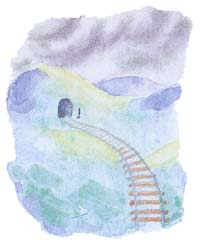 Driving The Last Spike
Driving The Last Spike
Genesis teach us a bit of history. Driving The Last Spike is a story about the building of the English railways and the working conditions told from a worker’s perspective. The structure resembles No Son Of Mine, but it soon shows that Genesis go a couple of steps further. Driving The Last Spike is ten minutes long, which makes it another one in the tradition of Genesis long songs. The band dispenses with an extensive instrumental, though. The first half of the song follow the classic pattern of verse and chorus before it picks up speed around the middle, the instrumentation becomes intenser and the song grows more and more dramatic. Driving The Last Spike is an absolute highlight on the album. A promo CD given out by Genesis’ tour sponsor Volkswagen offers an interesting edit of the song (this version is available on YouTube at this link). The shorter version could even have worked as a single. The lyrics are Phil Collins’ once more, and it is worth noting that Collins wrote some very good lyrics for We Can’t Dance.
 I Can’t Dance
I Can’t Dance
This is probably the biggest surprise on the album. I Can’t Dance is a minimalistic song that thrives on a guitar riff like rarely a Genesis song has done before. The lyrics are banal, the vocals different and the keyboard sound peculiar. What sounded like a bad joke at first turned out to be the second single and a huge world-wide hit that triggered a real hype. The video for the song became a favourite even on MTV, and Genesis set out to conquer the world. It is not a very popular song with the fans, but to be fair it has to be said that I Can’t Dance offers variety the way Keep It Dark did back then.
 Never A Time
Never A Time
It is amazing how long it took for the first ballad to surface on this album. Never A Time is a pop song that resembles It’s Gonna Get Better in places (“there was never a time to say it” / “if it’s gonna get better, it starts with a feeling”). It is somewhere between nice and inconsequential, and one could have done without it on the album. In the end, however, it was released as the sixth single of the album in some countries.
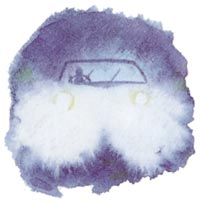 Dreaming While You Sleep
Dreaming While You Sleep
Dreaming While You Sleepis one of the tracks that does not have Collins’ lyrics – this time the author is Mike. It is about hit-and-run driving. Musically it is another highlight on the album. The drum computer sets a dark mood, the exchange of keyboards and guitars that was already excellent in Driving The Last Spike is perfected in this song. It is a real stunner when the real drums come in, the vocals are intense and the finale chillingly good. This song proves if proof were needed that Genesis still could put out come high-class stuff in 1991.
 Tell Me Why
Tell Me Why
A typical popsong trying to make the world a better place, that is what Tell Me Why is. Both these aspects invite the comparison to Collins’ solo works, the influence of which cannot be denied in this song. Only the sound is closer to Genesis than to Collins solo. Tell Me Why is not very spectacular but it was nevertheless chosen to become the fifth single. Like Never A Time, Tell Me Why would not play a role in the live set.
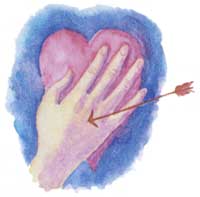 Hold On My Heart
Hold On My Heart
In 1991 it was a ballad, a typical Banks song and perhaps a resting point on the album. Later it turned into a symbol of the Collins pop era with the “old” fans. Regarding this song in an unbiased way became increasingly difficult because of that. When Genesis chose to release Hold On My Heart of all songs as the third single (and when it turned into a hit) they proved that Genesis and their hit singles had nothing to do at all with the fancult.
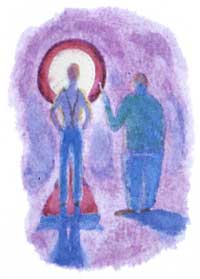 Living Forever
Living Forever
Tony Banks contributed the lyrics to this song. This time it is about the diet and wellness hype. Living Forever, which was included in the No Son Of Minesingle, is an uptempo rock song that should have been just a bit more aggressive. The vocals are excellent, so is the cooperation between keyboards and guitars, but the big highlight is the closing section when for the first time on the album Genesis embark on a full-blown instrumental part that can hold its own with their other instrumentals. They have still got what it takes!
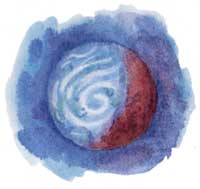 Way Of The World
Way Of The World
This is a typical Genesis pop song. The band apparently considered this one for the live shows for quite a long time, but it is a bit too unspectacular. There is actually not much to say about it: Nice tune, it fits quite well on the album soundwise, but it would not have been a big loss if Way Of The World had been released as a B-side only.

Since I Lost You
Since I Lost You is a thorn in many a fan’s side because it gets too close to Phil’s solo music, even though Phil had not yet recorded a ballad in this style at the time. It is a band song with a serious background. While Genesis were writing and recording We Can’t Dance Eric Clapton’s son Conor tragically fell out of a window and suffered fatal injuries. Phil wrote the lyrics and the whole band wrote the music in a jam session. It may not be a musical highlight, but because of the events at that time it is legitimate.

Fading Lights
There can be no doubt that Genesis have never forgotten in all these years where they actually came from. Every album has the typical Genesis style. Living Forever brought up the topic, but it is Fading Lights that is not only a thoughtful retrospective onto a long and successful career but also and much more so a declaration of love for progressive rock. Fading Lights actually achieves the impossible spanning the arc from the early 70s to We Can’t Dance. The instrumental section in the middle is among the best and even prog fans who usually avoid the Collins era get a lot of joy from this song. And there is something prophetical in Fading Lights – Tony Banks wrote this song, as it were, about the end of Genesis …
The songs beg the question why they chose such a dull album title. There must have been lots of better choices. We Can’t Dance is not only a colourful mix of pop songs and rock epics. It showcases perfectly what is possible in the musical space between drums, keyboards and guitars. It has been produced with a sophisticated warm sound that is sometimes dreamy and melancholic or driving and rocking. Banks’ ballad Hold On My Heart has ticked off most fans while the grand finale, Fading Lights, is revered by the staunchest prog purists. In between are songs such as Living Forever and Driving The Last Spike, songs only Genesis can write. Dreaming While You Sleep illustrates how Genesis could have sounded in a future with Collins but of course things went in a different direction. We Can’t Dance is not a huge classic like Selling England By The Pound, but it shows how mature their music is. It is the perfect production by an experienced band who can get together and spontaneously record an album. We Can’t Dance is certainly underrated. When Fading Lights ends one realizes it cannot get any more perfect. And this is how the chapter “Phil Collins” in the book of Genesis ends … for the time being.
by Christian Gerhardts
translated by Martin Klinkhardt
30th anniversary – 11th November 2021 – vote for your three favorite tracks from the album in our forum here.
